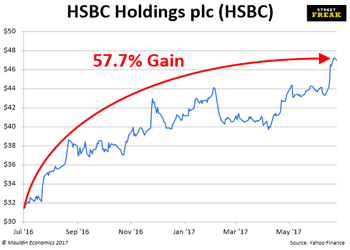
How to Learn About Finance
-
 Jared Dillian
Jared Dillian
- |
- July 27, 2017
- |
- Comments
That’s one of the hardest questions I get.
I think back to when I was learning about finance—one of my Coast Guard shipmates had these things called “mutual funds,” so I found some free literature about mutual funds and started reading.
At the time, I was living in an economically unfortunate town in coastal Washington State. There was a used bookstore in town. I bought two books: A Random Walk Down Wall Street, by Burton Malkiel, and Bogle on Mutual Funds, by John Bogle. The first two books I read were books on indexing!
After reading them, I knew with every cell in my body that the Efficient Market Hypothesis was wrong, and had to be disproved.
But those books were a good start. So sometimes when people ask me what books they should start with, I tell them about Malkiel and Bogle. Then I tell them that those books are all wrong. They look at me like I have a cabbage for a head.
Nowadays, when people ask me how they should learn about finance, I am kind of stuck. I actually went on Amazon and ordered all the lowbrow personal finance books: The Millionaire Next Door, Rich Dad, Poor Dad, the Tony Robbins book, the Dave Ramsey book.
I wanted to gain insight into what the “average” person was reading about investing, because I hope to one day finish a book on investing for average investors. I also don’t spend a lot of time writing for average investors… sometimes people complain that my Wall Street vocabulary can be a little dense.
I think those personal finance books have some good advice and some bad advice. But the one thing they all have in common is that they don’t really teach anything about finance. Maybe you form some good habits: you save 10% of your paycheck, you pick some mutual funds. But you don’t learn the theory behind any of it.
Do people want to learn the theory behind it? Or do they just want to be told what to do?
|
Who could have predicted that this large-cap British bank would soar 57.7% following Brexit? Jared Dillian did—giving Street Freak subscribers a spectacular home run. |
 |
Autopilot
People want things to be easy: “Just do these 7 easy things and you’ll wind up a millionaire!”
Unfortunately, investing is never easy. Not even for the pros. Certainly not for me.
Also, markets have a property called nonstationarity, which asserts that the markets change over time, and a strategy that works today probably won’t work in the future.
Like what you're reading?
Get this free newsletter in your inbox every Thursday! Read our privacy policy here.
The tragedy is that investing requires thinking, and thinking is hard, which is the whole premise of Daniel Kahneman’s book, Thinking Fast and Slow. People don’t like to think. They want to outsource their thinking to someone else.
For example, I cannot fix a car engine. Since I don’t know anything about it, I get help. The money I pay is a stupid tax for not knowing anything about fixing cars.
Getting help with investing also costs money, but at least with your car, you will probably get it fixed. There is no guarantee that your financial advice will be good.
Furthermore, you might get great advice and lose money—that happens a lot.
Or, you might get terrible advice and make money—that also happens.
The sad reality is that there are no simple rules, and your financial advisor is little-to-no help. We are all condemned to this existence where we have to make actual asset allocation decisions on a real-time basis. Get them wrong, and you retire with very little.
So the answer to the question: “What should I read to learn about finance?” is…
”Good luck, dude.”
There Is Another Way
Still, a financial advisor can help—just maybe not in the way you think.
You can’t expect that your financial advisor (like perhaps, someone from Edward Jones) is sophisticated enough to outsmart algorithmic traders and quant hedge funds.
But they can help with behavioral coaching.
An individual investor is his own worst enemy. He is excited by higher prices and demoralized by lower prices. He buys on the highs and sells on the lows. A financial advisor can help by keeping him invested, and not selling on the lows.
Half the country barfed it in 2009. They vastly underperformed the people who held on for dear life.
When it’s just you and the Vanguard website and the computer in the dark, and you’re down 30-50%, and you have no help, what do you do? A financial advisor, even a dumb one, can tell you everything is going to be okay. And the returns keep compounding.
Book Recommendations
One more thing. A lot of MBA programs have reputations for being content-lite, but I learned a buttload in my MBA program.
Like what you're reading?
Get this free newsletter in your inbox every Thursday! Read our privacy policy here.
Or you can read 400 pages of platitudes from a motivational speaker. Your volleyball.
subscribers@mauldineconomics.com

 Jared Dillian
Jared Dillian